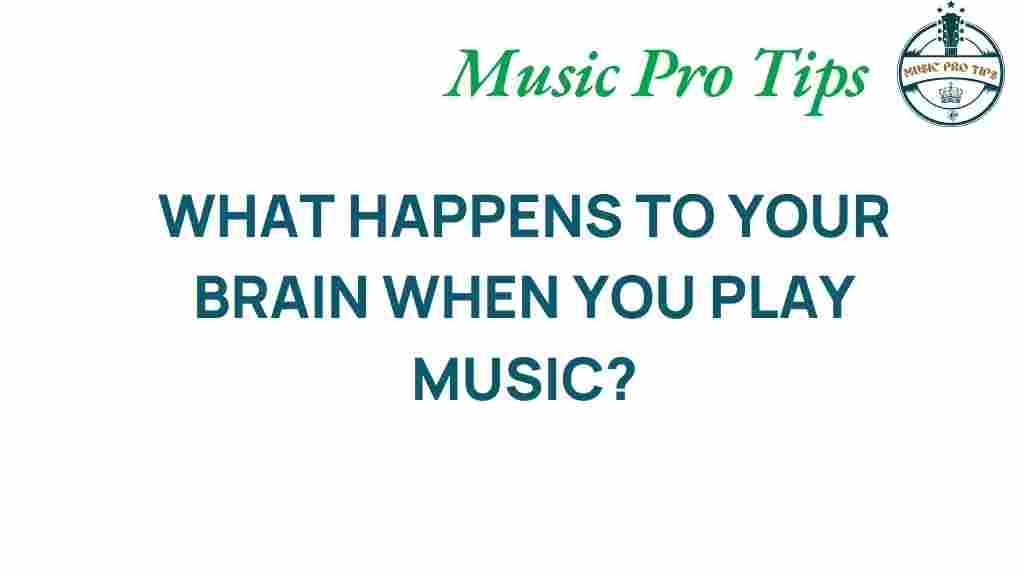Unlocking the Mind: The Astonishing Effects of Playing Music
Music has been an integral part of human culture for centuries, serving not only as a form of entertainment but also as a catalyst for emotional expression and social connection. Recent research has begun to uncover the profound effects that playing music can have on the brain, particularly concerning cognitive effects, neuroplasticity, creativity, learning, and mental health. In this article, we will explore how engaging with music can unlock the mind, enhance our cognitive abilities, and improve our emotional well-being.
The Cognitive Effects of Music
Playing music engages multiple areas of the brain, leading to significant cognitive enhancements. Here are some key cognitive effects of music:
- Enhanced Memory: Learning to play an instrument or even listening to music can improve memory functions. This is partially due to the way music stimulates the hippocampus, a critical area for memory and learning.
- Improved Attention: Musicians often develop better attention spans and the ability to focus. This is attributed to the discipline required in learning and practicing music.
- Better Language Skills: Studies show that music education can enhance language development and literacy skills, thanks to the overlap in processing musical and linguistic sounds.
The Role of Neuroplasticity
Neuroplasticity refers to the brain’s ability to reorganize itself by forming new neural connections throughout life. Playing music is a powerful way to enhance neuroplasticity, as it encourages the brain to adapt and grow. Here’s how:
- Structural Changes: Musicians often exhibit increased gray matter volume in areas of the brain related to auditory processing, motor control, and coordination.
- Functional Changes: Engaging in musical activities can lead to improved connectivity between different brain regions, enhancing overall brain function.
- Age-Related Benefits: Neuroplasticity remains active throughout life, meaning that older adults can still benefit from learning music, potentially mitigating age-related cognitive decline.
Creativity and Music
Playing music is not just about technical skills; it also fosters creativity. When musicians improvise or compose, they engage in a highly creative process that can enhance overall creative thinking. The interplay between rhythm, melody, and harmony stimulates the brain’s creative centers, leading to:
- Increased Problem-Solving Skills: Musicians often excel in lateral thinking and problem-solving due to their experience with improvisation and composition.
- Enhanced Emotional Expression: Music serves as a medium for expressing emotions and ideas that may be difficult to articulate verbally.
Music and Learning
Integrating music into educational settings can significantly enhance the learning process. Here are some ways music aids learning:
- Improved Retention: Information set to music is often easier to remember, a technique utilized in educational songs and rhymes.
- Multi-Sensory Learning: Music engages multiple senses, making learning more interactive and enjoyable.
- Motivation and Engagement: Incorporating music into learning environments can boost student motivation and engagement levels.
Music’s Impact on Mental Health
Mental health is another vital area where music plays a crucial role. Engaging with music, whether through playing an instrument or listening, can lead to numerous mental health benefits:
- Stress Reduction: Listening to soothing music can lower cortisol levels, helping to alleviate stress.
- Anxiety Relief: Music therapy has been shown to reduce symptoms of anxiety and depression by providing an emotional outlet.
- Enhanced Mood: Creating or listening to music can trigger the release of dopamine, the “feel-good” neurotransmitter, enhancing overall mood.
Exploring Rhythm and Emotion
The connection between rhythm and emotion is profound. Music has the unique ability to evoke feelings and memories, often transporting listeners to different times and places. Here’s how rhythm and emotion interplay:
- Emotional Resonance: Different musical styles and rhythms can elicit a range of emotions, from joy to sadness, often reflecting the emotional state of the listener.
- Physical Response: The human body naturally responds to rhythm, which can lead to physical expressions of emotion, such as dancing or tapping feet.
Step-by-Step Process to Unlock Your Mind with Music
Now that we’ve explored the various effects of music on the brain, let’s look at how to integrate music into your life effectively:
- Choose an Instrument: Select an instrument that interests you, whether it’s a guitar, piano, or even your voice.
- Set Goals: Establish clear, achievable goals for your musical journey, such as learning a specific song or mastering a technique.
- Practice Regularly: Consistent practice is essential. Aim for at least 20-30 minutes a day to build your skills.
- Engage with Others: Join a band, choir, or music group. Collaboration enhances creativity and social interaction.
- Experiment and Improvise: Don’t be afraid to explore different styles and create your own music. This fosters creativity and personal expression.
- Incorporate Music into Daily Life: Listen to music while working, studying, or relaxing to reap the cognitive and emotional benefits.
Troubleshooting Tips
While engaging with music can be immensely rewarding, you may encounter some challenges. Here are some troubleshooting tips:
- Feeling Overwhelmed: If you feel overwhelmed while learning, break down your practice sessions into smaller, manageable segments.
- Lack of Motivation: Set short-term goals and reward yourself for achieving them to maintain motivation.
- Difficulty with Rhythm: Practice with a metronome or play along with recordings to develop a better sense of timing.
Conclusion
Playing music can profoundly impact the brain, enhancing cognitive effects, fostering neuroplasticity, boosting creativity, improving learning, and promoting mental health. With the ability to connect deeply with our emotions through rhythm, music serves as a powerful tool for personal development and well-being. Whether you are a seasoned musician or a beginner, incorporating music into your life can unlock your mind and elevate your quality of life.
For more insights on how to incorporate music into your daily routine, check out this helpful guide. Additionally, for more in-depth research on the cognitive effects of music, visit this resource.
This article is in the category Theory and created by MusicProTips Team
